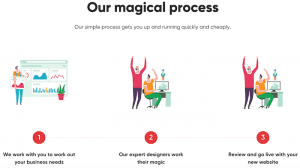
Writing website content can be a tricky thing to do, many businesses can struggle with this, whether it is due to having no time, difficulty getting started, or even feeling they have the ability to write it themselves.
In this article, we are going to look at some easy steps that will tell you how to write your own website content.
Why is website content important
There are many reasons that the content on a website is important, first and foremost is that it is how you tell people what you do and what you have to offer.
Secondly, because the majority of web traffic starts at a search engine, approximately 90%, and content is one of the main ways they understand who you are and what your website is about.
So your websites content is not something that can be left until the last minute or with little effort put in, it should be one of your greatest tools to acquire customers.
Why you should write about your own business
There are many reasons you might outsource your copywriting to someone not in your business, and this is totally fine, but a lot of the time it can be and should be written by those who work within the company.
The reason it is more advantageous that it is written by you is that you understand your business and the industry you are in and what the tone of your business is e.g personal, professional, friendly etc. You know what your customers want and what is important to them and from there can base your content around what your customer wants.
If you were to outsource the copywriting, a competent copywriter can write about your business and what you have to offer, but they may miss out on some of the nuances that makes you, you.
How to plan & write your website content
1. Know what pages will need content
Before you start writing, you need to know what pages you are going to have on the website, your website team should put together a sitemap of the pags and structure. Knowing the pages, means that you know the subject matter you will need to tailor each page to.
Once you have each page and know the subject matter, make a bullet pointed list of the key elements that need to be mentioned on those pages, there may be some overlap, but that’s ok, but no 2 pages should be the same.
Try and think of what’s important to know in terms of the product or service you are offering, what people will need to know, any pain points that can causes reluctance to go forward, another thing
2. Note down your USP’s
Once you’ve completed listing what is needed on the pages, you should make another list of your Unique Selling Points (USP’s). These are the reasons why people should choose your service or product over your competitors. This doesn’t need to be done for each page, as they will be used across multiple pages.
Your USP’s will be on the page to help convince people to choose you, as opposed to a competitor, some generic examples could be:
- Better price
- Faster delivery
- Quality of work
- Superior service
Though the example above can be used, try also having USP’s that are unique to you and set you apart from your competitors.
3. Create topic clusters
From your page notes, look at all the points you have on a page and start to compile together similar points into clusters. These are your topic clusters, which will dictate what each section of content will be about and what will need to be mentioned within the content topic.
If you find that some points don’t cluster together, try to see if your points can be broken down into further sub points to make up a topic cluster, for example, if ‘business operation process’ was a point for the page, this can be broken down into each steps taken in the process.
4. Start writing
Once you’ve put these together, you have a starting point for each page. You now have topic clusters that will dictate what a section of your website will be about, this can be interspersed with points from your USP’s as well.
When writing, add a subheading to each section, this will help better format your content and make it easier for people to read. A subheading will also give provide the main points covered in the page for those who simply scan instead of reading all your content, so make sure they help show your benefits.
If you find any are too short, see if it can be combined with another topic cluster, or these can be changed into smaller segments that highlight what you offer.

If you are having trouble starting on any of the writing, explaining what your topic cluster is about to another person or out loud to yourself, and then write what you say down. This can help you structure your content and include what’s important.
The final piece of advice is to ‘write for people, not robots’, what this means is don’t artificially inflate and stuff the content with waffle, and don’t try and write it to rank well in search engines. Only write down what’s important, if you are unsure about what you’ve written, try saying it out loud and see if it sounds like a normal thing people would say.
Still not able to write your website content
If you are still struggling with writing your own content, whether it is due to time or difficulty finding the right words, there is always the option to outsource it and have someone else write your content. There is no problem or issue doing this, this article has only been done to highlight that anyone can write their own content, plus, even if you do outsource your copywriting, it can always be updated later.




